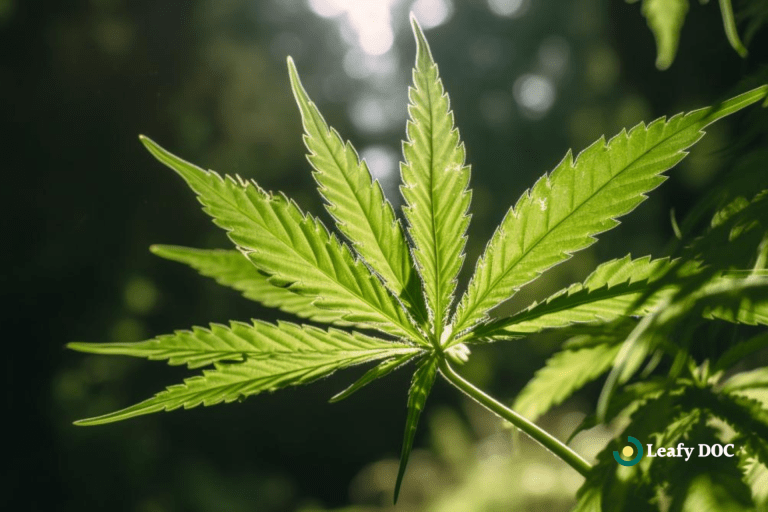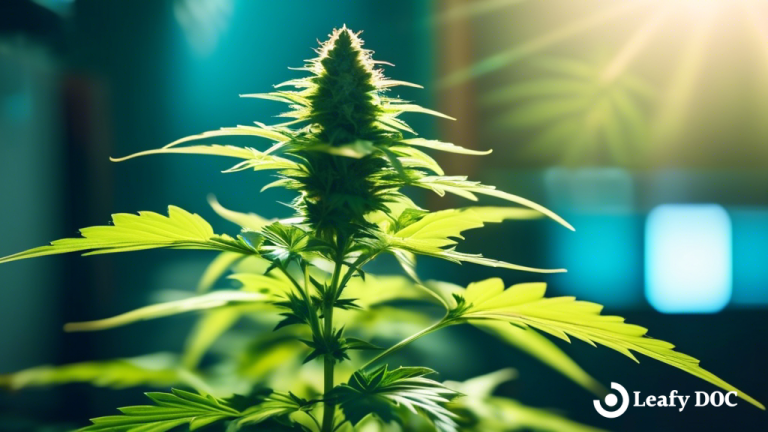Understanding The Cardiovascular Effects Of Medical Marijuana Use
by Haley Mills · May 1, 2024
Uncover the surprising truth about medical marijuana use and its impact on your heart health. Learn all about the cardiovascular effects of cannabis and make informed decisions for a healthier life. Don’t miss out! Click here to discover more.

Are you curious about the potential cardiovascular effects of medical marijuana use? Well, you’re in the right place! This article will take a look into the fascinating world of the endocannabinoid system and its relationship with cardiovascular function. You’ll discover how cannabinoids can impact your blood pressure and heart rate, and we’ll explore the potential benefits and risks of using medical marijuana for cardiovascular health.
We will embark on a journey to uncover the mysteries of the endocannabinoid system, the intricate network within your body that interacts with cannabinoids. We’ll also examine how these compounds can influence your blood pressure and heart rate, shedding light on the potential cardiovascular benefits and risks of utilizing medical marijuana.
So, if you’re ready to expand your knowledge and open your mind to new possibilities, let’s dive into the world of medical marijuana and its impact on your cardiovascular system.
Key Takeaways
- The endocannabinoid system plays a role in regulating cardiovascular function, suggesting that medical marijuana may have an impact on heart health.
- Medical marijuana can have both positive and negative effects on cardiovascular health, including lowering blood pressure and reducing inflammation, but also increasing heart rate and potentially straining the heart.
- The effects of cannabinoids on blood pressure and heart rate vary between individuals, highlighting the need for further research to understand the individualized response to medical marijuana.
- Individuals with pre-existing cardiovascular conditions should exercise caution and consult with their healthcare provider before using medical marijuana, as it may increase the risk of heart problems and interact with heart medications.
The Endocannabinoid System and Cardiovascular Function
The pre-existing knowledge suggests that the endocannabinoid system plays a significant role in regulating cardiovascular function, but you’re still in the early stages of understanding its full impact.
The endocannabinoid system is a complex network of receptors and molecules that help maintain balance in your body, including regulating blood pressure, heart rate, and vascular tone. It’s like the conductor of an orchestra, ensuring that all the different parts of your cardiovascular system work together harmoniously.
But here’s the exciting part – researchers are starting to uncover the potential benefits of medical marijuana in modulating the endocannabinoid system to promote cardiovascular health. By using cannabis compounds like THC and CBD, which interact with the endocannabinoid receptors in your body, you may be able to influence your cardiovascular function positively. It’s like having a secret key unlocks the door to better heart health.
Now, I know what you might be thinking – is this really possible? Can a plant help improve my cardiovascular function? Well, the early evidence is promising. Studies have shown that medical marijuana use may be associated with lower blood pressure, reduced inflammation, and improved vascular function. These findings suggest that cannabis could potentially be used as a therapeutic tool to support your cardiovascular health.
Effects of Cannabinoids on Blood Pressure
Explore how cannabinoids can impact your blood pressure and discover their potential effects. Medical marijuana contains cannabinoids, which are chemical compounds that interact with your body’s endocannabinoid system. When you consume cannabinoids, they can bind to the receptors in your body, potentially affecting various bodily functions, including blood pressure regulation.
While research on the specific effects of cannabinoids on blood pressure is still limited, there are some potential ways in which they may impact your cardiovascular health.
Here are three key points to consider:
- Cannabinoids may cause a temporary increase in blood pressure: Some studies suggest that cannabinoids can cause a short-term increase in blood pressure. This could be due to the way cannabinoids interact with the receptors in your blood vessels, leading to a temporary constriction of the vessels and a subsequent increase in blood pressure. However, it’s important to note that this effect is typically short-lived and may not pose significant risks to most individuals.
- Cannabinoids may have anti-inflammatory effects: Chronic inflammation is often associated with high blood pressure and other cardiovascular conditions. Some research suggests that cannabinoids may have anti-inflammatory properties, which could potentially help reduce inflammation in your blood vessels and improve overall cardiovascular health. However, more research is needed to understand these effects’ extent and potential long-term benefits fully.
- Individual responses may vary: It’s essential to recognize that the effects of cannabinoids on blood pressure can vary from person to person. Factors such as dosage, frequency of use, and individual physiology can all influence how cannabinoids impact your blood pressure. Therefore, if you’re considering using medical marijuana or any products containing cannabinoids, it’s advisable to consult with a healthcare professional who can provide personalized guidance based on your specific circumstances.
Impact of Medical Marijuana on Heart Rate
While some studies suggest that marijuana use can increase heart rate, the effects may vary depending on the individual and the specific strain of marijuana being used. For those seeking a sense of freedom and relief through medical marijuana, it’s crucial to be aware of how it may affect your cardiovascular system.
Medical marijuana contains a variety of cannabinoids, including THC and CBD, which interact with the body’s endocannabinoid system. When these cannabinoids bind to receptors in the body, they can have a range of effects, including increasing heart rate. This is because cannabinoids can activate the sympathetic nervous system, which is responsible for the body’s fight-or-flight response. As a result, the heart may start beating faster, pumping more blood throughout the body.
While this increase in heart rate is generally temporary and may not cause any significant harm, it’s still important to monitor your heart health if you’re using medical marijuana regularly.
As you explore the world of medical marijuana, it’s essential to keep in mind that everyone’s body is different, and the effects of marijuana on heart rate may vary. Factors such as the strain of marijuana, the method of consumption, and individual tolerance levels can all influence how your heart reacts to the drug.
If you have any concerns about the impact of medical marijuana on your cardiovascular health, it’s always a good idea to consult with a healthcare professional. They can provide personalized guidance based on your medical history and help you make informed decisions about your marijuana use.
Potential Benefits and Risks of Medical Marijuana Use for Cardiovascular Health
While some studies suggest that marijuana use can lead to an increased heart rate and potentially raise the risk of heart disease, there is also evidence to suggest that it may have beneficial effects on cardiovascular health.
Here are a few potential benefits and risks to consider:
- Reduced inflammation: Some research suggests that certain compounds found in marijuana, such as cannabidiol (CBD), may have anti-inflammatory properties. Inflammation is a known risk factor for cardiovascular disease, so reducing it could positively impact heart health.
- Stress relief: Marijuana has long been used for its calming and relaxing effects, which can help to reduce stress and anxiety. Chronic stress is associated with an increased risk of heart disease, so using medical marijuana to manage stress levels may have a positive impact on cardiovascular health.
Risks of medical marijuana use for cardiovascular health:
- Increased heart rate: One of the most well-known effects of marijuana use is an increased heart rate. This can put additional strain on the heart and potentially increase the risk of heart problems, especially in individuals with pre-existing cardiovascular conditions.
- Potential for drug interactions: Medical marijuana can interact with other medications, including those used to treat heart conditions. This can lead to potentially dangerous side effects or interfere with the effectiveness of certain medications.
Future Research and Implications for Clinical Practice
So, what’s next for further research on the impact of using medical marijuana on your heart? As the medical community continues to explore the cardiovascular effects of marijuana use, there are several key areas that warrant further investigation. One aspect is understanding the long-term effects of marijuana use on cardiovascular health. While studies have shown some potential benefits, such as reduced inflammation and improved blood flow, it is crucial to determine if these effects are sustained over time and if they outweigh any potential risks. Additionally, more research is needed to identify specific strains and dosage guidelines that may be safer for individuals with cardiovascular conditions.
To help you better understand the current state of research, here is a table summarizing the key findings from existing studies on medical marijuana and cardiovascular health:
| Study | Findings |
|---|---|
| Study 1 | Marijuana use may increase heart rate and blood pressure, particularly in individuals who are not regular users. |
| Study 2 | Some evidence suggests that marijuana use may be associated with an increased risk of heart attack and stroke, especially in older individuals. |
| Study 3 | Certain cannabinoids found in marijuana, such as CBD, have shown potential cardiovascular benefits, including reduced inflammation and improved vasodilation. |
| Study 4 | The effects of marijuana on cardiovascular health may vary based on factors such as strain, dosage, and individual susceptibility. |
| Study 5 | More research is needed to fully understand the potential benefits and risks of medical marijuana use for individuals with pre-existing cardiovascular conditions. |
Frequently Asked Questions
Can medical marijuana be used as a treatment for cardiovascular diseases?
Medical marijuana cannot be used as a treatment for cardiovascular diseases. While it may have some medicinal properties, seek conventional treatment options for heart conditions to ensure proper care and management.
Are there any adverse effects of medical marijuana on blood pressure regulation?
Medical marijuana can have adverse effects on blood pressure regulation. It may cause a temporary increase in blood pressure and heart rate, which can concern individuals with pre-existing cardiovascular conditions.
How does medical marijuana affect heart rate in patients with cardiovascular conditions?
Medical marijuana can affect heart rate in patients with cardiovascular conditions. Some anecdotal evidence suggests that it may cause a temporary increase in heart rate, but more research is needed to fully understand its impact.
What are the potential benefits of using medical marijuana for cardiovascular health?
Medical marijuana has potential benefits for cardiovascular health. It can help reduce inflammation, lower blood pressure, and improve blood flow, leading to a healthier heart.
What are the future research directions and implications for clinical practice concerning medical marijuana use for cardiovascular conditions?
In the future, research on medical marijuana’s effects on cardiovascular conditions may lead to groundbreaking discoveries. Imagine a world where patients have more options for managing their health, including natural alternatives.
Last Updated: September 23, 2025
Get Approved for Your Medical Marijuana Card in Minutes!

Get Your Medical Card
Connect with a licensed physician online in minutes

Like This Article?
Share with your friends
Table of Contents
Keep Reading
-
Enhance Your Meditation Practice With Cannabis
Uncover the transformative power of cannabis meditation to enhance your practice and find inner peace. Elevate your mindfulness journey today with this enlightening guide!
-
3 Steps to Obtain Your NYS Medical Marijuanas Card Easily
Learn how to easily obtain your NYS medical marijuanas card with our simplified guide.
-
Exploring Different Cloning Methods For Cannabis Propagation
Unleash the secrets of cannabis propagation with our guide on top cloning methods! From traditional techniques to innovative approaches, learn how to multiply your favorite strains effortlessly. Click now to master the art of cannabis cloning and watch your garden flourish!



